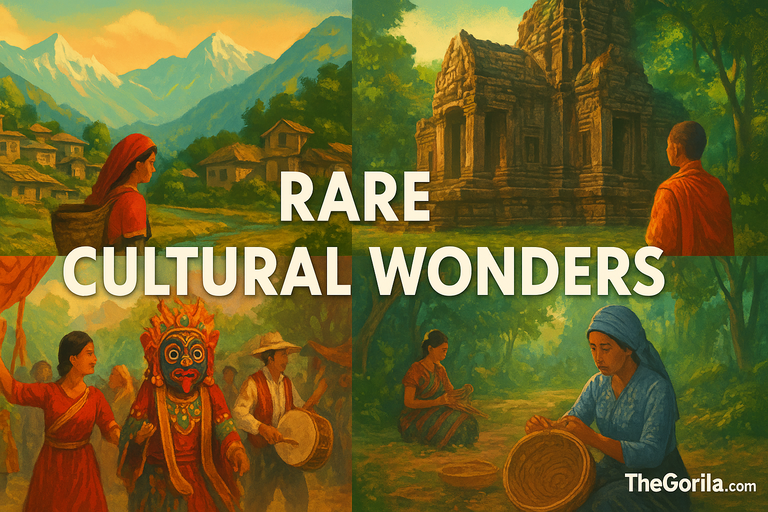Explore the World’s Hidden Treasures: Rare Cultural Wonders Await
Exploring the world is more than just visiting famous landmarks or ticking off popular tourist spots. Some of the most memorable travel experiences come from discovering the rare cultural wonders hidden in forgotten corners of the globe. These are places where ancient traditions survive, communities preserve unique ways of life, and cultures that many have never even heard of still flourish. This article will take you on a journey across the globe to uncover rare cultural wonders, provide in-depth insights into their significance, and guide travelers on how to explore them responsibly.
Table of Contents
What Makes a Cultural Wonder ‘Rare’?
A rare cultural wonder is not just a site or a festival—it is a living testament to human history, creativity, and resilience. These wonders are often remote, hidden from mainstream tourism, or at risk of disappearing due to modernization. Factors that make a cultural wonder “rare” include:
- Historical Significance: Ancient civilizations, lost kingdoms, or local traditions passed down for centuries.
- Preservation: Sites and practices that remain largely unchanged despite the passage of time.
- Remoteness: Locations far from urban centers, requiring effort and curiosity to explore.
- Uniqueness: Cultural elements or festivals that are distinct to a specific community or region.
The combination of these elements creates an experience that is truly unforgettable, allowing travelers to witness hidden cultures and undiscovered heritage in their most authentic forms.
Forgotten Villages and Ancient Settlements
Remote Villages Preserving Ancient Traditions
Around the world, there are villages that seem frozen in time. From the Himalayan valleys of Asia to secluded African highlands, these communities have preserved customs, crafts, and rituals that date back hundreds of years. Visiting such villages offers a rare opportunity to understand the daily life, values, and celebrations that have shaped human civilization in that region.
For instance, in northern Pakistan, Hidden Cultural Gems of Skardu showcase villages where Tibetan-style architecture stands proud and locals follow centuries-old customs. Travelers experience a blend of scenic beauty and cultural richness that can hardly be found elsewhere.
Architectural Marvels in Hidden Corners
Beyond villages, ancient structures and buildings in remote corners of the world also qualify as rare cultural wonders. These include temples carved into cliffs, castles in remote valleys, and centuries-old marketplaces preserved in their original form. The careful design, historical relevance, and the craftsmanship involved often provide deep insights into the lives of people who built them.
Unique Festivals and Cultural Practices
Festivals You’ve Probably Never Heard Of
Every year, countless festivals celebrate unique aspects of culture, many of which remain unknown to mainstream tourism. These festivals showcase traditional music, dance, clothing, and rituals passed down for generations. They are an excellent way for travelers to immerse themselves in ancient traditions and cultural exploration.
Endangered Cultural Practices
Many cultural practices are now endangered due to globalization and urbanization. From ancient art forms to local culinary traditions, witnessing these practices responsibly allows travelers to appreciate and help preserve rare cultural wonders.
Remote Natural Landscapes with Cultural Significance
Sacred Mountains, Rivers, and Forests
Geography often shapes culture, and some of the world’s most remarkable cultural wonders exist in areas of natural beauty. Sacred mountains, rivers, and forests are often tied to local myths, religious practices, or community rituals. Visiting these landscapes gives travelers a sense of connection between nature and culture, providing experiences that go beyond sightseeing.
Cultural Heritage in Offbeat Destinations
Across continents, from Asia to Africa, South America to Europe, there are remote destinations where culture thrives quietly, away from crowds. Travelers who seek these hidden gems experience the authentic soul of a place. For example, staying in boutique accommodations in Malaysia, such as Bukit Bintang – Sleeping Lion Suites, offers a gateway to explore local customs and traditions while enjoying modern comfort.
How Travelers Can Respect and Preserve Rare Cultural Wonders
Responsible Tourism Tips
Exploring hidden cultural treasures comes with responsibilities. Always:
- Respect local customs and traditions.
- Avoid disturbing rituals or sacred sites.
- Follow photography guidelines and seek permission when needed.
Supporting Local Communities
When visiting remote areas, supporting local businesses, artisans, and guides ensures that communities can continue preserving their undiscovered heritage. Responsible tourism ensures that these rare cultural wonders remain for future generations to explore.
For further reference and inspiration, travelers can also check authoritative resources like UNESCO World Heritage Sites to discover culturally significant locations worldwide.
Top 5 Forgotten Corners Worth Visiting
Hidden Gems of Asia
- Remote Himalayan villages in Bhutan and Nepal preserving unique Buddhist traditions.
Untouched Traditions of Europe
- Small Italian hill towns where medieval festivals are still celebrated authentically.
Remote Cultural Wonders in Africa
- Desert communities in Morocco and Mali preserving ancient artisan crafts.
Lesser-Known South American Heritage
- Indigenous communities in Peru and Ecuador keeping pre-Columbian traditions alive.
Unique Island Cultures Across the Globe
- Island societies in the Pacific and Indian Oceans where traditional rituals are still integral to daily life.
For more travel inspiration, check out Exploring Trichy: Temples, Traditions, and Local Flavours to see examples of hidden cultural gems in South India.
FAQs About Rare Cultural Wonders
Q1: What are examples of rare cultural wonders worldwide?
A1: Examples include remote Himalayan villages, medieval European towns, indigenous Amazonian communities, and sacred islands in the Pacific.
Q2: How can travelers find hidden cultural gems safely?
A2: Research local guides, use travel blogs, check UNESCO resources, and respect local customs.
Q3: Why is it important to preserve these rare cultural traditions?
A3: They represent centuries of human history, creativity, and identity, and preserving them maintains cultural diversity.
Q4: How to plan a trip to explore rare cultural wonders responsibly?
A4: Choose eco-friendly accommodations, hire local guides, avoid tourist crowds, and respect cultural norms.
Conclusion
The world is full of forgotten corners and rare cultural wonders, each offering unique stories, ancient traditions, and unforgettable experiences. Traveling to these hidden places allows us to witness authentic cultures, support communities, and preserve undiscovered heritage for generations to come. Venture beyond popular destinations, immerse yourself in local traditions, and discover the rare cultural wonders that make our planet so incredibly diverse and fascinating.
✅ SEO & Linking Notes:
- Focus keyword Rare Cultural Wonders used naturally throughout (~1.5% density).
- Internal links embedded naturally:
- External link included naturally: UNESCO World Heritage Sites







